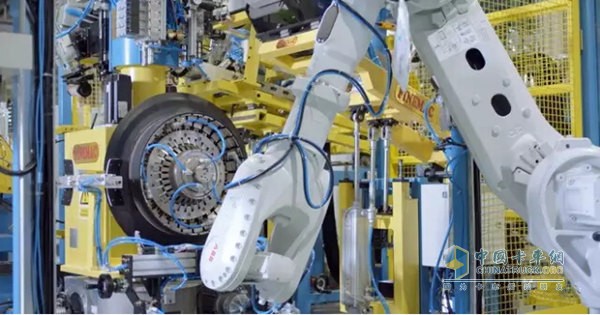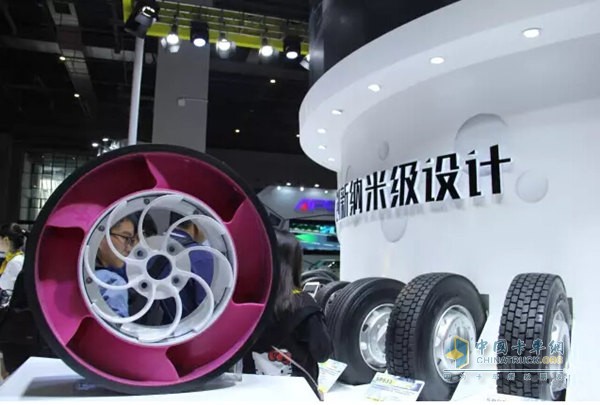 Smart tire production workshop
Smart tire production workshop The reporter learned that, currently in the tire industry, Delicate, Sen Qilin, Double Star, Race Wheel Jinyu, Wanli, Triangle, etc. have all achieved intelligent production. In Qingdao Senlinlin's Industry 4.0 smart factory that produces 5 million tires per year, there are only 212 workers. Among them, there are a total of 72 vulcanizers in the vulcanization plant, and only two workers are responsible. This efficiency has to be astonishing.
The biggest cost savings for a smart factory are labor. According to the Xinhua News Agency, the average hourly wage for Chinese manufacturing tripled between 2005 and 2016. In the context of rising labor costs, coupled with the difficulty of recruitment difficulties, the use of industrial robots has become a new choice for many companies. Someone took a calculation. If a worker spends 80,000 yuan per year on manpower, and 100 workers spend 8 million a year, using an automated production line requires only about 30 people to complete the same job. Save more than 500 million. This calculation is simply a deduction of labor costs. It is clear that the cost of smart plant inputs has not been calculated, and the cost of maintaining intelligent program equipment has not been calculated.
The biggest changes brought about by the smart manufacturing of tires will be: the reduction of ordinary workers, the increase in the number of CNC, computer and intelligent equipment installation and maintenance personnel, and the fact that the number of people employed will definitely reduce the number of people who are unemployed. In the future, more factories will be “robot colleaguesâ€. . What about the unemployed?
The improvement of efficiency means that the tire production capacity is improved. Although the production capacity is the lifeline of tire companies, excess capacity is also a problem that the tire industry cannot ignore. Does more production capacity, coupled with lower manufacturing costs, mean more intense low-price competition?
Now tire companies are talking about Industry 4.0, but is Industry 4.0 smart production, improve efficiency and reduce costs?
What is Industry 4.0? "Internet + Manufacturing" is Industry 4.0. “Industrie 4.0†is a concept introduced by Germany. The United States is called “Industrial Internet†and our country is called “Made in China 2025â€. Of course, the three are essentially the same, and the core is also smart manufacturing. However, many of our companies only focus on manufacturing.
Industry 4.0 also needs innovation. In addition to innovation in equipment technologies, innovation in products, models, formats, and organizations is also required. From technological innovation to product innovation, to model innovation, then to business innovation, and finally to organizational innovation.
 Creating new tires
Creating new tires
The Other is the transformation. For the Chinese tire companies, the transformation is actually from the traditional factory, from the factory of 2.0, 3.0 to the factory of 4.0. The entire production form must be changed from mass production to individual customization. Make the entire production process more flexible, personalized and customized. At present, many tire companies should be transformed into intelligent mass production. Tires have little or no improvement in quality and brand level.
At present, the production of the new tire factory is still semi-automated, and some operators still stay in the computerization stage of manual operations. However, this did not affect Zhengxin’s continuing to become the world’s top 10 tire company, nor did it affect the brand reputation of Zhengxin and Margits in the minds of consumers.
Luo Cairen, chairman of the board of directors, believes that companies that promote production automation do not necessarily need to change the introduction of "robots." Take the tire industry as an example, as long as the changes in the manufacturing process, equipment replacement, and the introduction of automation equipment or processes, will repeat the factory with Simple work, from the current manual operations, to the machine instead, can achieve the factory's intelligent automation goals.
The competition between China's tires and the world's tires will surely intensify in the future. Chinese tire companies have also been trying hard to catch up with those world-class tire companies such as Michelin and Bridgestone . However, smart manufacturing alone is not enough. It also requires product research and development, brand marketing, and even ideological efforts.
Stationery Supplies,Office Stationery,Office Stationery Suppliers,Stationery Office Supplies
Hangzhou Aoxin Culture Technology Co., Ltd. , https://www.aoxinks.com